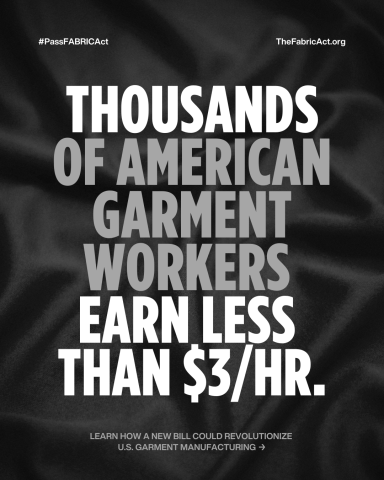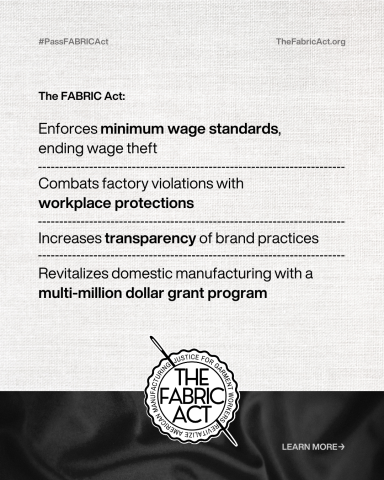What is the FABRIC Act?
The Fashioning Accountability and Building Real Institutional Change (FABRIC) Act, advocated by a powerful coalition of garment workers, NGOs, and businesses, was reintroduced by Senator Kirsten Gillibrand, D-N.Y. on September 15, 2023. The bill aims to protect US garment workers by eliminating predatory piece-rate payments that are an industry standard practice, while expanding garment manufacturing in the US.
Senator Gillibrand explains, “For far too long, garment workers and the once bustling American manufacturing industry have been overlooked. Garment workers in the United States are often underpaid, overworked, and put in unsafe conditions. From designers to managers to workers, women overwhelmingly play a leading role in this important industry. I’m reintroducing the FABRIC Act, a one-of-a-kind federal bill, that would thread the needle of protecting workers’ rights, putting an end to subminimum pay rates, and ensuring equitable compensation for garment workers, while also making historic investments in domestic garment manufacturing. Protecting the garment workforce is a sustainability issue and has direct impacts on economic prosperity, environmental sustainability, and gender equality. It’s time to take bold action at the federal level to change the fabric of the American garment manufacturing industry so we can protect these vital workers and not only make American, but buy American.”
In order to become law, the FABRIC act needs support from workers, consumers, businesses, and investors. Green America is joining with workers and allies nationwide to support the FABRIC Act. Here’s why we should all support it.
Reason 1: Stop Workers Exploitation in the U.S.
Currently, there are approximately 100,000 garment workers across the United States, with 40,000 concentrated in Los Angeles. Labor abuses are common in the industry with some workers making less than $3.00 per hour. The FABRIC Act was modeled after the successful passage of S.B. 62, the Garment Workers Protection Act in California in 2021, which established an historic minimum wage for garment workers throughout the state.
By and large, the overworked and underpaid garment workforce consists of immigrant, people of color, and women.

Delia, originally from Guatemala, is a member of the Garment Workers Center in Los Angeles and she explains, “I am a seamstress with more than 30 years of experience in the industry. [….The FABRIC Act] will impact an industry that has paid by the piece for many years and has a lot of exploitation and wage theft. Los Angeles garment workers like myself organized to demand a minimum and fair wage and managed to pass the law called SB62 in California in 2022. This law has created changes that I personally have benefited from because it guarantees me a minimum and fair wage in my work. Now the cost of living is so expensive – from rent, food, to medicine — a guaranteed minimum wage would help me to cover my expenses. And the purpose of the FABRIC Act is to extend these protections so garment workers in every state can benefit from these types of protections. The law would also hold brands accountable and demand that they comply with the law.”
“Now the cost of living is so expensive – from rent, food, to medicine — a guaranteed minimum wage would help me to cover my expenses. And the purpose of the FABRIC Act is to extend these protections so garment workers in every state can benefit from these types of protections. The law would also hold brands accountable and demand that they comply with the law.”
The garment workforce in the United States experiences the second-highest rate of wage theft in comparison to other groups of workers in the country. It is no surprise that garment workers are mostly immigrants and women. For Petra, a garment worker in San Antonio, TX, “[coming] to the United States following the American dream... My first job, I was discriminated against for being a woman, for my color, and for not speaking English. I accepted it because I didn't know my rights.”
This federal legislation, if passed, would hold fashion brands and manufacturers nationwide accountable to pay garment workers a minimum wage and eliminate the current notorious piece-rate pay scheme in a complicated supply chain. The proposed bill would further lay the groundwork for increased accountability through the establishment of a national registry that will create transparency and allow the US Department of Labor to hold bad actors accountable.
Reason 2: Reshoring a greener garment manufacturing sector
Garment manufacturing in the United States reached its height in 1973 with 1.4 million in the workforce, and experienced a steady decline since then. A policy of offshoring and outsourcing has led to brands relying on overseas factories with the lowest labor costs and labor protection, often accompanied by marginal environmental regulations. Senator Gillibrand makes the crucial connection that “[p]rotecting the garment workforce has direct impacts on economic prosperity, environmental sustainability, and gender equality.”
According to the report “The Environmental Benefits of Reshoring” published by the Reshoring Institute in 2021, reshoring manufacture can reduce transportation emissions, improve energy efficiency, reduce pollution, and increase transparency.
The bill provides a $50 million per year support program to provide grants and technical assistance to manufacturers for safety improvements, training, equipment upgrades, and workforce development. And it provides a 30 percent tax credit to companies to offset their onshoring costs. According to Ayesha Barenblat, the CEO of Remake, “[t]he FABRIC Act is a timely bill that would create jobs of dignity right here at home at a time when onshoring interest has gone up. The bill includes necessary investments to spur cleaner, greener manufacturing in the United States.”
Reason 3: Propel U.S. as global leader in a growing market for responsibly produced apparel.
Behind fashion’s glamour and fast fashion’s convenience is the dark reality of forced labor, rampant wage theft, and abuse. One of the historic pieces of legislation President Joe Biden signed in his first year in office was the Uyghur Forced Labor Prevention Act. However, around the world, garment workers are owed an estimated $11.85 billion in stolen wages and severance between March 2020 and March 2021 alone.
There is a growing movement of designers, companies, and consumers calling for more ethical fashion nationwide. The US could become a leader in producing garments that pay a living wage to workers, protect the environment, and provide long-lasting and stylish clothes. Green apparel companies, like those in Green America’s Green Business Network, would be able to onshore all their production and lower their shipping costs. Consumers could trust that the Made in the USA label guarantees minimum standards in terms of labor protections.
The fashion and apparel industry has been a driver of a race to the bottom. With the FABRIC Act, we can begin to correct our course and invest in responsibly produced apparel. We can put the US on the map as a producer of environmentally responsible clothes that benefits workers.






